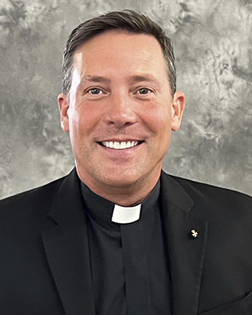
Recovering the Ancient Vision: Rethinking Catechesis as whole-life formation
Monday, July 21, 2025
*Fr. Richard Vigoa
I recently read an interesting article exploring the connection between liturgy and catechesis. The author argued that the Church’s typical response to the rise of the “nones”, those who claim no religious affiliation, has doubled down on programs, classes, and apologetics. Yet this strategy, while well-intentioned, may overlook a deeper truth: people don’t lose their faith because they failed a theology exam. Faith is not primarily lost or found at the level of ideas. It is shaped at the level of the heart, the imagination, and the daily habits that structure one’s life. In this, the early Church has much to teach us.
For early Christians, catechesis was not a classroom experience. It was formation for martyrdom. In the second and third centuries, to prepare for baptism was to prepare for death. The catechumenate was a gradual initiation into an entirely new way of life. Baptism was not merely a ritual washing, but participation in Christ's death and resurrection, a dying to the old life and the start of a new existence shaped entirely by Christ. From Tertullian to Cyprian, the Fathers of the Church saw the baptized as new creations in Christ, citizens of a kingdom not of this world.
What is striking in these early centuries is how tightly moral formation and doctrinal instruction were interwoven. Learning the faith was synonymous with learning to live differently. As Irenaeus of Lyons taught, Christians were not simply instructed in theological propositions, but initiated into a new vision of reality, what he called the “rule of faith.” To know the faith was to inhabit its logic, to see the world through its lens.
At the heart of this formation stood Scripture. The early Church did not relegate the Word of God to scholars or clergy alone. Scripture was proclaimed, prayed, memorized, and meditated upon daily. The rhythms of Christian life were structured around hearing and internalizing the Word. This is an area where, today, many Catholics suffer a real deficiency. Despite the Church’s rich biblical tradition, large segments of the faithful do not know the Bible. We cannot ignore this gap if we are serious about forming disciples.
It is important to acknowledge that, in certain periods of Church history, lay access to Scripture was restricted. For instance, the Council of Toulouse in 1229 limited vernacular translations, not to withhold the Word, but to guard against heretical interpretations in a largely illiterate culture. Later, the Index of Forbidden Books and similar regulations further complicated lay access to Scripture. Yet these measures were contextual, not doctrinal: they aimed to protect the faithful, not to discourage encounter with God’s Word. Since Pope Pius XII’s encyclical Divino Afflante Spiritu in 1943, and especially through the Second Vatican Council’s dogmatic constitution Dei Verbum, the Church has reasserted the centrality of Scripture in the life of every Catholic. Pope Francis’s institution of the Sunday of the Word of God in 2019 underscores this renewal.
The task before us is not merely to encourage Bible study as another parish program, but to help Catholics recover the daily habit of opening the Scriptures, not as an intellectual exercise, but as a way of listening to God and living according to His Word. Here, we might humbly learn from our Protestant brothers and sisters, who have successfully fostered Bible literacy through small groups, reading plans, and accessible resources. The goal is not to copy these methods uncritically, but to find Catholic ways to foster a culture in which reading Scripture becomes as normative as Sunday Mass.
By the fourth century, the catechumenate had become more formal, but its goal remained the same: to initiate people into a new way of life. Catechumens were apprenticed into Christian living, guided by sponsors, and formed through daily prayer, fasting, and the rituals of Lent. Mystagogical catechesis deepened this process after baptism, using the liturgy itself as a school of faith. Believing rightly and living rightly were understood as inseparable.
Perhaps this is our greatest challenge today: to move beyond treating catechesis as mere information delivery, and recover its purpose as whole-life conversion. The aim is not simply well-informed Catholics, but transformed ones. Catechesis must lead to encounter, not just with ideas about God, but with the living God Himself.
Finally, this vision of whole life formation truly bears fruit only when pastors and parish leaders offer more than programs -they offer presence. Statistics and studies consistently show that pastoral accompaniment, lived out in small moments- being present at all church events, well-prepared homilies, praying with parishioners, being available for baptisms and funerals- anchors faith more deeply than any formation class ever could. As Saint Pope John Paul II taught in his apostolic exhortation Catechesi Tradendae, the goal of catechesis is “not only to put people in touch but in communion, in intimacy, with Jesus Christ.” This communion is fostered when priests and lay leaders walk alongside their flock, opening Scripture, celebrating sacraments, and carrying life’s burdens.
This isn’t about saying clergy fall short; it’s a reminder of how much power their visible, ongoing presence has. Equally, it’s an invitation to every deacon, parish minister, catechist, youth minister, and lay leader to see accompaniment as their first task. Parishes flourish not because of the number of programs but because of the depth of relationships. When pastoral teams and faithful live and pray together, Scripture is shared not as abstract text but as the living Word that speaks to real lives.
If we are serious about renewing catechesis, we begin here: with a shepherding presence that preaches with both words and with life, companions on the journey of life shaped by the Word of God. In this, perhaps the early Church still has much to teach us.

